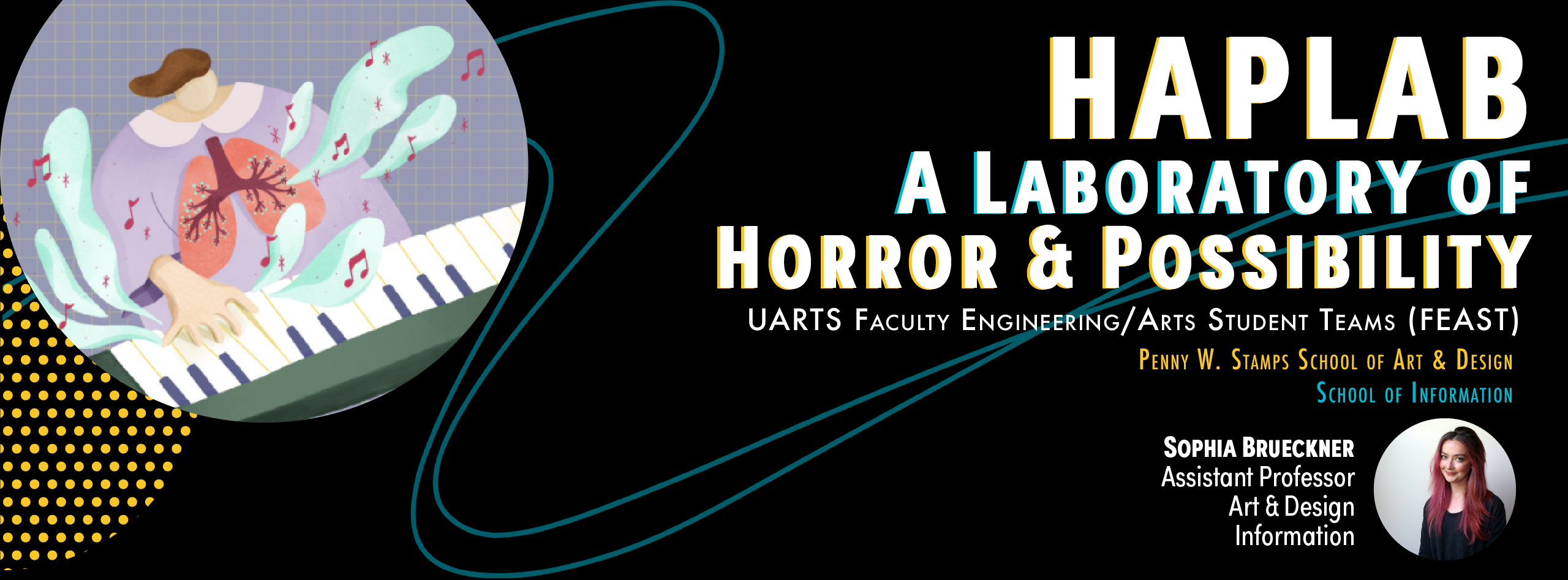
*This project is on hiatus as of Winter 2023.
The HAPLAB is an interdisciplinary research lab led by Prof. Sophia Brueckner (who teaches ARTDES:420.1 Sci-Fi Prototyping) exploring possible, probable, and, most importantly, preferred futures. Faculty and students from multiple disciplines work together to create prototypes and tangible experiences imagining the ethical implications of when technologies scale and exploring hopeful possibilities related to haptics (tangible interfaces), wearable technology, social interfaces, algorithms, and more.
Currently, we are recruiting for 2Inspire, a Biosciences Initiative project in collaboration with faculty James Ashton-Miller (ME/BME), Joseph Gascho (SMTD), Peng Li (LSI), and Muneesh Tewari (Int Med). This project involves measuring the breathing of keyboard performers (eventually other types of musical instruments) and feeding it back to them as well as other performers through a combination of haptics and audiovisuals. This project will generate new knowledge about the role of breath in musical performance (research papers) as well as culminate in artistic installations/musical performances.
2Inspire: Optimizing Breathing for Exceptional Musical Performance
- inspire, v. To draw in the breath.
- inspire, v. To influence, animate, or actuate (a person) with a feeling, idea, impulse, etc. (OED Online, 2020)
In the field of music, the quality of performance is measured by more than just playing the notes accurately. A performance might be considered exceptional for a number of reasons including its virtuosity, expressiveness, lyricism, and creativity. In the case of wind instruments and voice, the sound is literally the sonification of the performer’s breathing for the audience. There is therefore a direct correlation between any exceptionalism in musical performance and the breathing of the performer. However, breathing is essential to the performance of all instruments as well as to performance in a number of other fields. This project aims to understand the relationship between the quality of breathing and exceptional performance. Using sensors, our first objective is to understand the relationship between breathing quality and exceptional musical performance. We will then use data visualization, sonification, and/or visceralization (haptics) to communicate breathing data back to musical performers. We hypothesize that quality of breathing correlates with musical performance, and that we can improve musical performance by providing multisensory feedback of breathing data to the performer.
The 2Inspire project answers the following questions:
- What physiological features of breathing are associated with, and might predict, exceptional musical performance?
- Can we improve performance by changing how the performer breathes? E.g. increase focus, reduce fatigue, improve the expressiveness or impact of the performance?
- Can real-time and/or retrospective representations of how expert performers breathe transfer knowledge to beginning and advanced students to help them learn more quickly and effectively?
- How can our research be applied to other types of performance that depend on breathing?
Faculty Project Lead
 Sophia Brueckner, born in Detroit, MI, is a futurist artist / designer / engineer. Inseparable from computers since the age of two, she believes she is a cyborg.
Sophia Brueckner, born in Detroit, MI, is a futurist artist / designer / engineer. Inseparable from computers since the age of two, she believes she is a cyborg.
She received her Sc.B. in Computer Science and Applied Mathematics from Brown University. As a software engineer at Google, she designed and implemented products used by tens of millions and later on experimental projects within Google Research.
Brueckner earned her MFA in Digital + Media at the Rhode Island School of Design and MS in the Fluid Interfaces group at the MIT Media Lab where she investigated the simultaneously empowering and controlling aspects of technology within computer programming, algorithms, user experience design (especially social networks) and tangible interfaces.
Since 2011, Brueckner has taught Sci-Fi Prototyping, a course combining sci-fi, extrapolative thinking, prototypes, and the ethics of invention/design at MIT, Harvard, RISD, Brown, and the University of Michigan. Both the class itself as well as the students’ individual projects received international recognition and were featured by The Atlantic, Smithsonian Magazine, Wired, NPR, Scientific American, Fast Company, and many others.
Brueckner is the founder and creative director of Tomorrownaut, a creative studio focusing on speculative futures and sci-fi-inspired prototypes.
Brueckner’s work has been featured by SIGGRAPH, Artforum, Eyeo, ISEA, the Peabody Essex Museum, Portugal’s National Museum of Contemporary Art, TEDx, the Bemis Center for Contemporary Art, and more. She is currently an assistant professor at University of Michigan’s Stamps School of Art and Design and School of Information where she teaches sci-fi prototyping, digital fabrication, creative programming, design, and art + technology. Her ongoing objective is to meaningfully combine her background in design and engineering with the perspective of an artist to inspire a more positive future.
